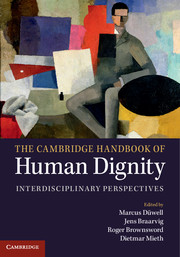Book contents
- Frontmatter
- Contents
- List of contributors
- Foreword
- Why a handbook on human dignity?
- Acknowledgments
- 1 Human dignity from a legal perspective
- 2 Human dignity: concepts, discussions, philosophical perspectives
- Part I Origins of the concept in European history
- Part II Beyond the scope of the European tradition
- Part III Systematic conceptualization
- 19 Social and cultural presuppositions for the use of the concept of human dignity
- 20 Is human dignity the ground of human rights?
- 21 Human dignity: can a historical foundation alone suffice? From Joas’ affirmative genealogy to Kierkegaard's leap of faith
- 22 Kantian perspectives on the rational basis of human dignity
- 23 Kantian dignity: a critique
- 24 Human dignity and human rights in Alan Gewirth's moral philosophy
- 25 Human dignity in the capability approach
- 26 Human dignity in Catholic thought
- 27 Jacques Maritain's personalist conception of human dignity
- 28 Scheler and human dignity
- 29 Dignity and the Other: dignity and the phenomenological tradition
- 30 Dignity, fragility, singularity in Paul Ricœur's ethics
- 31 Human dignity as universal nobility
- 32 Dignity in the ubuntu tradition
- 33 Posthuman dignity
- 34 Dignity as the right to have rights: human dignity in Hannah Arendt
- 35 Individual and collective dignity
- Part IV Legal implementation
- Part V Conflicts and violence
- Part VI Contexts of justice
- Part VII Biology and bioethics
- Appendix 1 Further reading
- Appendix 2 Universal Declaration of Human Rights
- Index
- References
20 - Is human dignity the ground of human rights?
from Part III - Systematic conceptualization
Published online by Cambridge University Press: 05 March 2015
- Frontmatter
- Contents
- List of contributors
- Foreword
- Why a handbook on human dignity?
- Acknowledgments
- 1 Human dignity from a legal perspective
- 2 Human dignity: concepts, discussions, philosophical perspectives
- Part I Origins of the concept in European history
- Part II Beyond the scope of the European tradition
- Part III Systematic conceptualization
- 19 Social and cultural presuppositions for the use of the concept of human dignity
- 20 Is human dignity the ground of human rights?
- 21 Human dignity: can a historical foundation alone suffice? From Joas’ affirmative genealogy to Kierkegaard's leap of faith
- 22 Kantian perspectives on the rational basis of human dignity
- 23 Kantian dignity: a critique
- 24 Human dignity and human rights in Alan Gewirth's moral philosophy
- 25 Human dignity in the capability approach
- 26 Human dignity in Catholic thought
- 27 Jacques Maritain's personalist conception of human dignity
- 28 Scheler and human dignity
- 29 Dignity and the Other: dignity and the phenomenological tradition
- 30 Dignity, fragility, singularity in Paul Ricœur's ethics
- 31 Human dignity as universal nobility
- 32 Dignity in the ubuntu tradition
- 33 Posthuman dignity
- 34 Dignity as the right to have rights: human dignity in Hannah Arendt
- 35 Individual and collective dignity
- Part IV Legal implementation
- Part V Conflicts and violence
- Part VI Contexts of justice
- Part VII Biology and bioethics
- Appendix 1 Further reading
- Appendix 2 Universal Declaration of Human Rights
- Index
- References
Summary
Many venerable legal documents suggest that human dignity is the ground of human rights. The German Constitution (1945) opens in Article 1 with the captivating declaration: ‘human dignity is inviolable’, and goes on in Article 2 to state: ‘The German people therefore acknowledge inviolable and inalienable human rights as the basis of every community, of peace and of justice in the world’ (emphasis added). The Helsinki Accords (1975) even more explicitly claim that human rights ‘derive from the inherent dignity of the human person’. On this view human beings have rights because they have dignity. On an even stronger view, which is also quite common in constitutional law, it is the very function of those rights to protect the dignity of human beings. In that case, all human rights are specifications of one fundamental right: the right to have one's dignity (or the dignity of the human species?) respected.
At the other end of the spectrum of possible views we find the sceptical idea that all appeals to human dignity are entirely vacuous: they can be made for any specific claim about human rights whatsoever, they are routinely being made for opposing views, for example about euthanasia, and have no argumentative, but only rhetorical, force. ‘Dignity is a useless concept…and can be eliminated without any loss of content’ (Macklin 2003).
- Type
- Chapter
- Information
- The Cambridge Handbook of Human DignityInterdisciplinary Perspectives, pp. 200 - 207Publisher: Cambridge University PressPrint publication year: 2014
References
- 7
- Cited by



